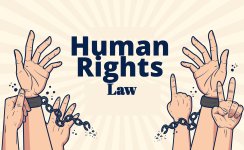A Silent Contract Between State and Soul
Human rights law is not just about legal frameworks—it's a moral compass, a silent promise that no matter where you are born, your life matters. Whether you’re a child in a refugee camp, a journalist seeking truth, or a woman demanding equal pay—human rights laws stand between your dignity and its violation.
Codified through international agreements like the Universal Declaration of Human Rights (UDHR) and enforced through regional and national instruments, these laws aim to protect the inalienable rights of all individuals. But in 2025, are we truly living up to that promise?
Where Rights Meet Reality: A Global Dilemma
While nearly every country has signed treaties, implementation remains inconsistent. Nations often pick and choose which rights to honor—sometimes favoring political or economic interests over human dignity. In Myanmar, Sudan, and even democratic strongholds like the U.S. or India, human rights violations continue to surface, often disguised under the veil of national security or public order.
Technology has amplified both sides of the coin. On one hand, surveillance and AI threaten privacy rights. On the other, social media and global watchdogs now shine a light on abuses faster than ever before.
Beyond Courtrooms: The Role of People
Human rights law isn’t reserved for courts and lawyers. It lives in protests, journalism, education, and even hashtags. From #MeToo to #EndSARS, grassroots movements are challenging the status quo and forcing lawmakers to listen. Laws alone can't protect rights unless citizens demand their enforcement.Rights vs. Responsibility: The Balancing Act
Here’s the paradox: with every right comes a responsibility. Freedom of speech doesn’t grant a license to spread hate. The right to protest should never morph into violence. Human rights laws must walk a tightrope, ensuring liberty without chaos.
That’s where modern reforms are aiming—making laws more adaptive, inclusive, and intersectional. New discussions around digital rights, LGBTQ+ protections, and climate justice are expanding what it means to be truly “free.”
The Path Forward: Educate, Advocate, Reform
Change doesn’t come solely from court rulings; it starts in classrooms, boardrooms, and ballot boxes. We need to educate youth on their rights, train officers and judges with empathy, and hold leaders accountable through advocacy and policy reform.Governments must stop treating human rights as an obstacle and instead embrace them as a foundation for peace, progress, and prosperity.


